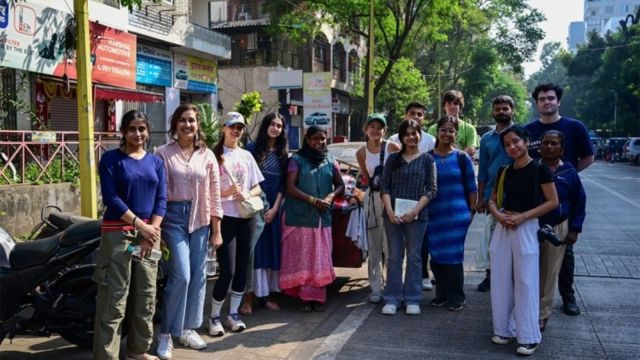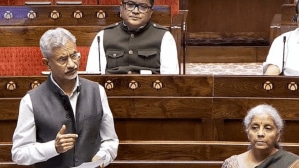Click here to join Express Pune WhatsApp channel and get a curated list of our stories
Ashoka University students join hands with team from University of Toronto to explore Pune’s urban challenges
In a bid to develop critical social consciousness as part of their Urban Studies programme, the students accompanied workers of SWaCH, a cooperative of waste collectors, to analyse various social dynamics in Pune.
 The TNDTE practical exams took place from October 7 to November 7, while the theory exams were held from October 21 to October 26. (Photo Credit: Reyansh Lokare)
The TNDTE practical exams took place from October 7 to November 7, while the theory exams were held from October 21 to October 26. (Photo Credit: Reyansh Lokare)In a collaborative effort between the University of Toronto (U of T) and Ashoka University, nine students were picked from each of the two establishments to engage in coursework that offered them a window into the social dynamics of Pune.
Among other activities, the students accompanied workers of SWaCH, a cooperative of self-employed waste collectors, to analyse various social dynamics to develop critical social consciousness as part of their Urban Studies programme.
The universities partnered with School of Cities India and Tata Trusts to explore three city-building projects identified by Indian civil society organisations. The initiative was facilitated by the U of T India Foundation.
“By collaborating and working with organisations like SWaCH, students have the opportunity to see how grassroots organisations move towards urban equity and facilitate sustainability in a very specific Global South context. The academic urban theories about equity and sustainability come alive, and give students examples of how NGOs operationalise these concepts,” said Aditi Mehta, Urban Studies Professor at U of T who accompanied the students.
Developing critical consciousness
Prof Mehta explained that critical consciousness refers to the students’ abilities to recognise and analyse social, political, and economic structures that lead to inequality in society as well as understand their own positionalities in the world.
“It often requires leaving a place you are familiar with and entering a completely new environment to build awareness of how these social, political, and economic structures operate on a local and global scale. In terms of this project, Pune was selected as it is approximately the same size as the Greater Toronto Area, with a similar range of urban challenges, reinforcing the opportunities for reciprocal learning and solutions generation,” she added.
Over four days, the students visited a SWaCH collaborative as well as local flyovers to gather data, besides Yutak Trust, MIST café, Shaniwar Wada Fort, Pune’s Centre for Development Studies and Activities, Osho Garden, and Tulshi Baug Market. They focused on diverse urban challenges and public policies.
 Over four days, the students gathered data and focused on diverse urban challenges and public policies. (Photo Credit: Reyansh Lokare)
Over four days, the students gathered data and focused on diverse urban challenges and public policies. (Photo Credit: Reyansh Lokare)
Jake Karpouzis, a fourth-year student of Public Policy and Urban Studies, said: “We’re putting together a blog of the trip so the various organisations involved can read about it and take those experiences back to the classroom.” Karpouzis devoted his time to exploring how the makeshift parking lots and garbage dumps beneath city flyovers in Pune can be revitalised into more valuable spaces.
Final suggestions to be delivered in April 2025
The students will continue to work on their projects throughout the academic year now that they have conducted initial studies of the area and its issues. Their final suggestions and solutions will be delivered to their partners in Pune in April 2025.
The course forms part of various activities and collaborations carried out by the U of T India Foundation in recent months. “The opportunity to engage with community partners in India, as well as with Indian students on joint projects expands students’ understanding of different perspectives and fosters connections and skills for a lifetime of career opportunities as a global citizen,” said Gauravi Lobo, Head of U of T India Foundation, Mumbai.
“The University of Toronto is engaged in international partnerships in many parts of the world, with a network of over 200 global partners,” Lobo said.
Click here to join Express Pune WhatsApp channel and get a curated list of our stories












